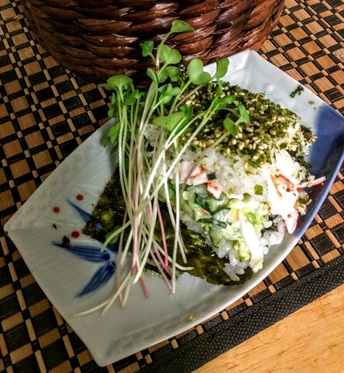 Since this month is National Nutrition Month, I wanted to put my two cents in and comment on how this microgreen journey has taken me down this path to becoming a flexitarian. For the sake of clarity, let's define what a flexitarian diet is. Simply put, being a flexitarian means becoming more vegan but not forsaking eating meat, just less meat. In an online article published this week in the Greatist, Holly Harbin explains ... "For those following a vegetarian diet, the potential health benefits are huge. A balanced vegetarian diet has been shown to decrease body mass index and lower your risk of high blood pressure, cardiovascular disease, stroke, metabolic syndrome, diabetes, and even cancer... What’s more, eating meat is more than a personal health issue—it affects the wellbeing of our planet too. Recent research shows that agriculture and the livestock industry is third largest generator of greenhouse gases, right behind transportation. In fact, a 20 percent decrease in meat consumption throughout the U.S. would have the same energy saving impact as every American driver switching from a standard car to a Prius." I grew up in a family that had some sort of meat at every meal. We did eat a lot of fresh foods since I grew up in Hawaii, but basically every meal included some sort of meat. As the last few years unfolded, I started studying the nutritional benefits that raw foods and microgreens and sprouted mixes gave to my foods. It became obvious to me that by controlling the ingestion of meats and processed foods could have a profound effect on my health and well being. It was at this point that I looked at being a vegan or vegetarian and decided that such a dramatic shift in my lifestyle would not be easily sustainable. Enter this idea of being a flexitarian and how this could be easily accomplished by simply cutting down my consumption of meats in easily taken steps. So several years ago my son and I made a conscious effort to eat healthier and live. Little did we know that there was a term to describe what we were doing and what the effects of these choices could do. In retrospect, it was an incredibly timely decision. I do believe that I am healthier and less susceptible to illness now. Hard to pinpoint a "feeling better" effect since you are always living in a state so it is hard to compare to your past if you have been essentially healthy. We eat a lot more vegetarian meals now and I would say we are approaching the expert level and defined in the article. I do believe though that this is typically a no lose scenario, we will be healthier over the long run and we are also creating a healthier planet. It is not hard to cut down on your consumption of meat and prcessed food. Just a small step to go a little at a time and all of a sudden you will be there!
0 Comments
Leave a Reply. |
UrbaformUrbaform is a technology integrator and developer specializing in food production in the urban environment ... Archives
February 2020
Categories |



 RSS Feed
RSS Feed